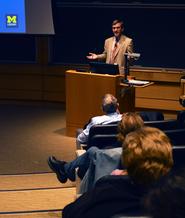
Hamilton welcomed Charles Watkinson as its speaker for the Couper Phi Beta Kappa Lecture on Oct. 20. Watkins is the director of University of Michigan Press and associate university librarian for publishing at University of Michigan Library. His talk, titled “Open Access Monographs: Why Should Authors, Librarians, and Administrators Care?” explored the impact of the emerging open access movement on scholarly publishing.
Watkinson began his lecture on Open Access with an anecdote from his days as an archaeology student. When his professor had asked him to consult a rare manuscript available at the New York Public Library Watkinson was pleasantly surprised that, thanks to the efficiency of the NY Library system and the priorities of Dick Couper as its president, he gained access to the materials he sought within only two hours. The preservation, discoverability, and access of the public to rare materials are all priorities of the Open Access movement about which he went on to speak.
Watkinson provided an overview of the University of Michigan’s unique publishing model. He explained that there are three branches to the publishing library: University of Michigan Press, which focuses predominantly on formal products and maintains traditional, extensive publishing procedures;, Michigan Publishing Services, a digital publisher for works that could appear as open access journals, books, or data bases; and Deep Blue, the University’s institutional repository.
Turning to the monograph and Open Access, Watkinson used John B. Thompson’s Books in the Digital age, to define the monograph as “a work of scholarship on a particular topic or theme which is written by a scholar or scholar and intended for use primarily by other scholars.”. Watkinson then illustrated the different opportunities for digitizing monographs, and explained some of the drawbacks and complications that may accompany the process of creating open access monographs.
Watkinson addressed some of the challenges facing university presses as they seek to work with Open Access. He noted that for the most part the existing landscape has been shaped almost entirely by the needs of publishers to remain economically viable and the funding sources of scholarly research to derive benefit from their investment. Watkinson encouraged authors, especially humanities faculty, to let their concerns and priorities be known by joining the conversation about Open Access.
Among the concerns he has frequently heard from faculty are that publishing a monograph open access may result in their research have decreased value within their scholarly and professional communities, might lead to increased risks of plagiarism, might disenfranchise authors from less wealthy institutions, and might lead to loss of the royalties. Scholars also fear that a digitized open access monograph system could contribute to the eminent demise of the printed book.
Watkinson’s presentation then moved to address benefits and opportunities of a digitized open access monograph system. He emphasized increased accessibility and discoverability of works in an open monograph system. When one’s works are more accessible, they have the potential to have greater impact, which benefits both authors and the institutions with which they are associated. Open Access monographs also have the potential to revolutionize the nature of the traditional monographs by offering authors and readers materials that cannot be contained within the pages of a book as we know it.
Watkinson cited examples. Digitalculturebooks (U of Michigan), Open Book Publishers (Cambridge, U.K), and Luminos OA (U of California Press) all illustrate new and creative ways in which academic presses are transforming the traditional monograph in exciting ways. Watkinson tied his lecture back into the Hamilton community, by asking attendees to consider what the relationship might be between an open access monograph system and our own Digital Humanities Initiative.
To conclude, Watkinson addressed both the opportunities and the challenges that face authors in a period in which the cost of the traditional monograph makes it an increasingly unsustainable and rare object. How authors and institutions, such as Hamilton, respond to the possibilities of new collaborations in publishing is critical. While funding a new publishing system may serve as an obstacle, the benefits of having access to such a wide selection of scholarship may well outweigh the cost.
Watkinson shared an initiative of liberal arts colleges currently under development called The Lever Press. A group of liberal arts colleges and their faculty are poised to assume a new role in academic publishing through national collaboration made possible through joint investment in publishing. By drawing upon the expertise of faculty across its institutions, this initiative aims first to begin conversations around open access monographs in these schools, and will be governed by the mission and ethos of liberal arts colleges
Posted October 24, 2015
